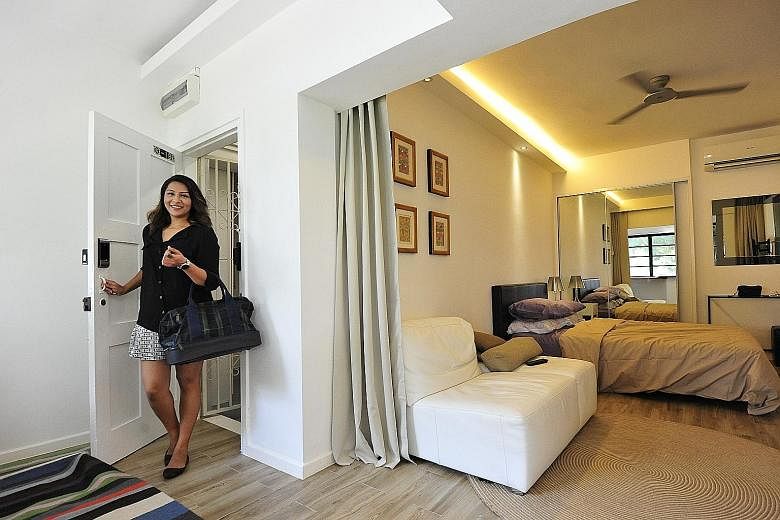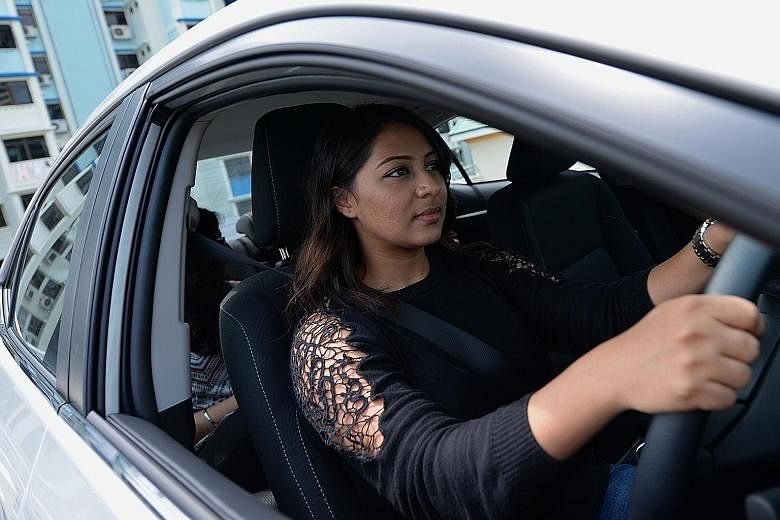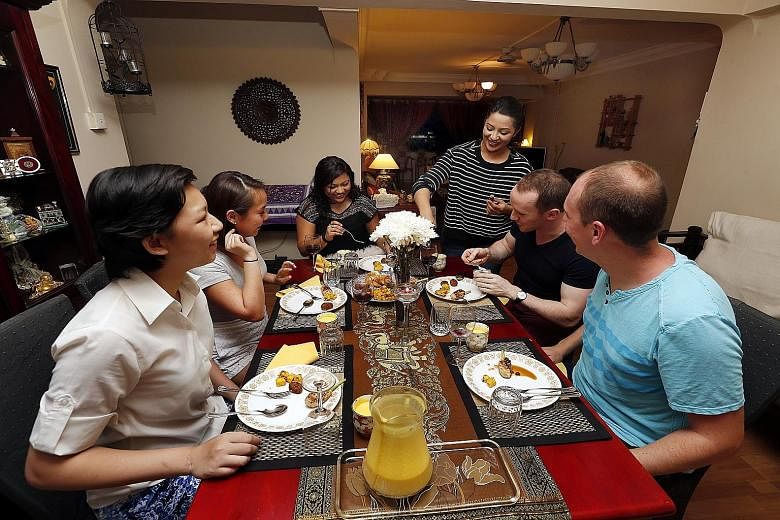It is 9pm on a Wednesday night and I am sitting in my car feeling upset.
It is not because I have been on the road for six hours straight as an UberX driver or because I have wasted 10 minutes trying to locate my latest passenger - a guy who accidentally keyed the wrong address into the app.
It is what this guy says to me when I eventually find him 2km away, 10 minutes later.
"Aunty, Commonwealth."
Wait. I am probably just three years older than this kid. Who's he calling aunty?
Gritting my teeth, I drive. He later hops out with his eyes still glued to his phone and I pocket an easy $13.30 for my trouble.
I will be honest, it took a lot out of me to rate him five out of five stars.
I am no taxi driver, but I had just picked a stranger up and sent him home for a fee.
This makes me part of a sharing- economy ecosystem - a term recently included in the Oxford English Dictionary and defined as an economic model in which assets or services are shared between private individuals, either for free or for a fee, typically by means of the Internet.
What that means is Singaporeans are no longer just turning to conventional taxis, shops or restaurants for their needs.
Instead we are hopping into strangers' cars (UberX, GrabCar), inviting them to stay in our homes (Airbnb, PandaBed), hosting them for dinner (PlateCulture, BonAppetour), sharing our work spaces (Woolf Works, The Working Capitol) and renting them our unused stuff (Rent Tycoons, Leendy, BlockPooling).
Consumers sometimes pay a fraction of the cost of buying something directly from a traditional business.
Today, Singapore has more than 15 local counterparts in its own sharing economy. Ryde, for example, allows one to rideshare and iCarsClub lets you rent a car from your neighbour for the weekend.
TRUST IN THE AGE OF THE INTERNET
Pioneered by Internet services company eBay in 1995, the person- to-person marketplace has become a veritable economic force today, one that is seeing us entrust strangers with our underutilised possessions and making a quick buck off the exchange as a result.
It is a cultural and behavioural shift that has come about in part because we have realised that modern Internet can help individuals trust one another again, more than the traditional Internet ever could.
According to Mr Jia Jih Chai, managing director of South-east Asia and India at Airbnb, "in the past five years, the power of social media, safer Internet banking and a series of sophisticated algorithms providing checks and balances have allowed us to prove that we truly are who we say we are on the Internet".
The result? Trust between human beings is beginning to rise, even among strangers.
-
Who's sharing what
TASKS
Services that help get your odd jobs done
Butler Factory - Connects customers with freelancers from various industries
CarPal - Courier service for same-day delivery services in Singapore
BEAUTY
Book a housecall from an independent beauty operator
Vanitee - Community marketplace for beauty artists and customers
ACCOMMODATION
List, find or rent everything from a room to an entire apartment
Airbnb - Offers accommodation listings in more than 190 countries
PandaBed - Singapore company offering vacation rentals and alternative accommodation in Asia
CAR-SHARING/ CARPOOLING
Rent cars or share a ride with people going in the same direction
iCarsClub - Singapore's biggest private car rental marketplace
Sharetransport.sg - Offers options for car and bus pooling
Ryde - On-demand carpooling services
TAXI SERVICES
Apps that let you call a private car on demand
UberX - Low-cost option from Uber offering private car services
GrabCar - Brainchild of South-east Asia-based app GrabTaxi offering private cars on demand
HOME GOODS
Share, trade or lend anything under the sun
BlockPooling - Connect with people who live in your neighbourhood
Rent Tycoons - Rent items from individuals in Singapore
Leendy - Swop goods with users on the app
FOOD
Host or get hosted for a home-cooked meal
BonAppetour - Singapore-based online social dining platform
PlateCulture - Lithuania-based social dining site
According to Mr Eugene Tay, president of the Sharing Economy Association (Singapore) that was set up in June last year to represent the collective interests of local sharing-economy businesses, it is a business model that is particularly suited to Internet-savvy and densely populated countries such as Singapore.
"In a resource-constrained city like ours, it makes financial and environmental sense to monetise the use of underutilised assets - be it a spare room or a car," he says.
"Not only does it foster entrepreneurship, but it also creates a sense of community between Singaporeans that is often lost in our emotionally disconnected age."
No wonder then that New York Times columnist Thomas Friedman has declared this the age of the sharing economy - one that is "producing both new entrepreneurs and a new concept of ownership".
But what really are the perks and pitfalls of participating in this collaborative ecosystem?
The only way to find out was to try some services out first hand. And so I did - everything from becoming a chauffeur with private- car service UberX to serving a home-cooked meal with social dining site PlateCulture.
Here is how it all went down.
I'M AN "UBERPRENEUR"
My foray into the era of Internetenabled intimacy starts with signing up as a driver with UberX, the low-cost arm of the five-year-old American Uber brand, which allows any regular Joe to turn his car into a private cab.
Valued by Forbes at US$50 billion (S$70 billion), it is the world's most highly capitalised start-up.
Uber, which set up its Singapore arm in 2013, has made the application process painless enough. After undergoing a background check the week before, I cram into a room with 50-odd would-be drivers for an hour-long briefing.
Then I register a business online for payment purposes (the $70 it costs is reimbursed to me by Uber) and sign up to rent a car through LionCity rentals, an Uber-owned car-rental company that offers cars such as a Honda Civic for rent for $70 a day. This is approximately half the cost of a regular taxi rental.
UberX drivers also have the option of using their own cars and driving whenever they want - flexibility and "Uberpreneurship" being the biggest draws sold to us during the information session.
Within three hours - equipped with my Uber-provided iPhone that is loaded with the app - I am ready to hit the road.
UberX drivers cannot do street pick-ups, so I get requests forwarded to me whenever I am nearest to a passenger requesting a car.
In my 12-hour jaunt, I drive everywhere from Upper Serangoon to Loyang, mostly ferrying under-35s to and from work.
After the end of two six-hour shifts, I make a profit of $186, after deducting Uber's 20 per cent cut.
What is the biggest takeaway from my experience? Uber users are chatty. And patient.
This could be due to the in-app payment feature of most sharing- economy businesses, meaning no money is physically exchanged and face-to-face interactions feel more genuine and relaxed.
Most of my passengers know I do not have a vocational licence and forgive me when I make a wrong turn.
Three of the 13 passengers sit in the front seat with me. A friendly man and I have an impromptu karaoke session to Bon Jovi's Living On A Prayer while stuck in a jam. Another engages me in a long discussion about pop culture and the power of Taylor Swift.
Mr Chan Park, Uber's general manager for South-east Asia, says: "It's a sense of community that we're trying to build. Because riders and drivers both rate each other after each trip, people are more likely to be more friendly and open to each other.
"It's a system that provides immediate feedback and lets us constantly improve the service for everyone involved."
For Uber, that means bad seeds (both drivers and passengers) get booted off the service should they drop below an average of 4.3 stars without a valid explanation.
The same goes for sites such as Airbnb, PandaBed, BonAppetour and iCarsClub, which rely heavily on ratings and reviews to verify good customer experiences.
The result? An increased likelihood of interacting with a pleasant person.
IT'S YOUR REPUTATION, STUPID
It is evident that personal reputation incentivises good behaviour better than any security rule.
A few days later, while preparing dinner for four strangers at my home - set up through social-dining site PlateCulture - I find myself worrying that they will rate my three-course meal zero out of five stars.
I am not 100 per cent confident of the "authentic biryani" boldly advertised on my chef's profile and these people are paying $25 a head.
The anxiety is similar to what I feel when the rear tyre of the gold Nissan Sylphy that I rented from a kindly man for the weekend hits a kerb while I am trying to parallel park.
The local car-sharing portal iCarsClub that facilitated my $90 a day rental requires owners and renters to maintain good, accident- free ratings to continue to use the service.
The thought of having to return a damaged car to the owners' Stevens Road home and receiving a negative review races through my mind as I bolt out to check the damage.
But, hallelujah, there is nary a scratch and my reputation can live to see another day.
Back to the dinner. My guests, an Englishman, Irishman and two Filipino women, bring wine, an open mind and good conversation.
I, in turn, cop out of the cooking and get my mother to make 80 per cent of the food, ensuring everyone leaves full and happy.
Co-founder of local social-dining site, BonAppetour, Ms Rinita Vanjre Ravi, says: "Peer-to-peer interactions allow for a more authentic experience than you could ever get from a large business conglomerate or chain restaurant. You start off as strangers, but end as friends."
Another compelling argument for the sharing economy is the financial ripple that extends beyond the transactions between guest and host.
Mr Lester Kang, co-founder of Singapore-based short-term home- rentals site Pandabed, says: "A tourist staying in a Jalan Besar apartment not only benefits the host he's residing with, but he's also more likely to patronise local mom- and-pop shops, which helps to support decentralised local businesses."
It is true. While working out of a young couple's one-bedroom studio apartment in Tiong Bahru that I rent off Airbnb for $160 a night, I find myself taking a break to walk around the heritage neighbourhood and eat at the cute cafes in the area - a much richer experience than a chain hotel in the city could ever provide.
SHARING SANS SECURITY NET
But despite the largely glowing customer reviews, the sharing economy has faced a minor backlash - primarily from regulators, governments and entrenched businesses which are facing a new wave of competition.
One issue is the legality of the whole enterprise, something that global regulatory bodies and governments are continuing to grapple with.
Ridesharing, short-term home rentals and private-car rentals do not have explicit legal guidelines governing their use.
Another issue is employee rights because independent operators do not qualify for conventional benefits and security nets such as subsidised healthcare. (Sorry, mum, but thanks for cooking.)
To tackle these issues, the Sharing Economy Association (Singapore) is helping to facilitate consultations between the relevant authorities and local sharingeconomy businesses.
And though there continues to be numerous policy grey areas in Singapore, all the businesses Life interviewed say that their recent conversations with bodies such as the Urban Redevelopment Authority and Land Transport Authority have been promising.
It seems most local partners do not have a problem with their lack of "employee benefits" either.
Mr Mohammed Ziad Khan, 38, a former project coordinator in the oil and gas industry who has been driving with UberX full time for four months, says: "I get flexibility because I'm an independent contractor. Giving up some benefits is just a small trade-off for me."
Similarly, for Ms L. Chew, 42, a long-time user of iCarsClub, the benefits of the sharing economy outweigh the costs.
She says: "Over the past two years, I've rented out my 2007 Peugeot more than 20 times for $120 a day. Not only does it help me cover my petrol and road tax costs, but I'm also able to help people who need a car for a short period of time. It's a win-win situation."
On their part, sharing-economy businesses are also evolving with client feedback to protect their users.
Airbnb, for example, has a US$1-million liability insurance programme in place for hosts renting out their homes.
Rent Tycoons, a local rental portal for underutilised goods such as GoPro cameras and tents, encourages renters to include a safety deposit in the cost of the rental. And iCarsClub provides insurance for all their renters and has customers' backgrounds checked by their insurance provider AXA to make sure they have a consistent safety record.
Overall, it seems that the collaborative consumption model is heading towards greater benefits for the user and consumer - and for that, we have reason to be optimistic.
And though I might have retired my chauffeur cap for now, do not be surprised if you see me on the roads with UberX again at some point.
I will be the one who has no issues making a detour if you have keyed in the wrong address.
Just don't call me Aunty.




